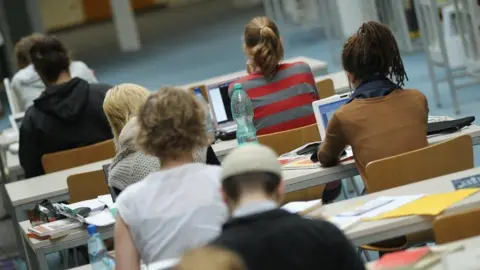Immigration status: Ministers reverse May-era student visa rules
International students will be allowed to stay in the UK for two years after graduation to find a job, under new proposals announced by the Home Office.
The move reverses a decision made in 2012 by then-Home Secretary Theresa May that forced overseas students to leave four months after finishing a degree.
Prime Minister Boris Johnson said the change would see students "unlock their potential" and begin careers in the UK.
But campaign group Migration Watch called it a "retrograde" step.
The change will apply to international students in the UK - there were around 450,000 last year - who start courses at undergraduate level or above from next year onwards.
They must be studying at an institution with a track record in upholding immigration checks.
Under the proposals, there is no restriction on the kinds of jobs students would have to seek and no cap on numbers.
"If one needed evidence of a new approach to immigration within government, today's announcement allowing all foreign students to stay for two years after graduation is just that," the BBC's home editor Mark Easton said.
"Where Theresa May introduced what she called a hostile environment around migration rules, with an ambition to reduce net migration to the tens of thousands, Boris Johnson has promised to scrap that target and encourage the brightest and best to come and live and work in global Britain."

'To hell and back'
 Shreya Swamy
Shreya SwamyStudent Shreya Swamy, from India, says the proposal is "a great step forward" but it is "a sad day" for her as it has come too late to help students already in the UK.
She has just finished studying for a master's degree at the University for the Creative Arts, in Kent and Surrey, and says she has "struggled so much" with the current rule giving her up to four months to look for work.
Jobs for international graduates "are close to nil", she says, blaming their lack of experience.
"I have been through hell and back trying to figure out my career plan these past few months because it seems practically impossible to have one in the UK," she says.
"I feel really helpless, and almost regret coming here to study because I'm going to end up going back home with a very expensive piece of paper."

Chancellor Sajid Javid tweeted that the move was "about time", adding that the government "should have reversed this silly policy years ago".
Former universities minister Jo Johnson - who quit his brother's government last week - tweeted that it was "success at last" after being involved in the cross-party campaign.
Alistair Jarvis, chief executive of Universities UK, welcomed the decision, saying it would benefit the UK economy and reinstate the UK as a "first choice study destination".
"Evidence shows that international students bring significant positive social outcomes to the UK as well as £26bn in economic contributions, but for too long the lack of post-study work opportunities in the UK has put us at a competitive disadvantage in attracting those students," he said.
But Alp Mehmet, chairman of Migration Watch UK, said the decision was an "unwise" step that would "likely lead to foreign graduates staying on to stack shelves".
"Our universities are attracting a record number of overseas students so there is no need to devalue a study visa by turning it into a backdoor route for working here," he added.
Others suggested that the overhaul of the rules should come in sooner so students who are due to graduate next year could be eligible for the visa.
Stephen Isherwood, chief executive of the Institute of Student Employers, said there was "ample time" for the new rules to be implemented for those who finish their studies in 2020.

How many international students stay in the UK?
 Getty Images
Getty ImagesBy BBC Reality Check team
Just over 450,000 international students are currently studying in UK universities.
Of these, almost two-thirds are from outside the EU, so will require a student visa to be in the country.
Between about 170,000 and 185,000 of these students graduate each year and, under current rules, they have four months to transfer to another visa - such as a work visa - or decide to continue studying.
In 2018, 6,300 individuals moved from student visas to skilled work visas, meaning they have officially been offered a job paying at least £20,800 in the first year.
A further 450 were granted "high-value migrant" visas, which are normally reserved for those with particular expertise in a field or those who have a set sum of money to invest in the country.
We also know that almost 40,000 student visas are extended each year, implying that a large number of graduates are continuing studies in the UK.
That still leaves more than 100,000 students not formally extending their visas - and we don't have complete figures for how many of them leave the UK.
However, analysis of exit checks by the Office of National Statistics suggests that 97% of them were leaving on time.

Shadow home secretary Diane Abbott said Labour has always said graduates should be able to work here after their studies.
"It enables them to contribute to our economy, our universities and to research, and helps us to attract the brightest and best from around the world.
"It is a great pity that ministers have previously supported measures that did the opposite."
'International collaboration'
The government's announcement coincides with the launch of a £200m genetics project at the UK Biobank, a charity and health resource that contains information and samples from 500,000 people.
The UK Biobank collected DNA samples and health questionnaire information from 500,000 British volunteers over several years and is now open to researchers from anywhere in the world who want to use those resources to develop new treatments for diseases.
The prime minister said projects of this kind wouldn't be possible "without being open to the brightest and the best from across the globe to study and work" in the UK.
Mr Johnson said: "That's why we're unveiling a new route for international students to unlock their potential and start their careers in the UK."
Britain had a "proud history" of being at the centre of international collaboration, he said, adding that it was "bringing together experts from around the globe to work in the UK on the world's largest genetics research project".
